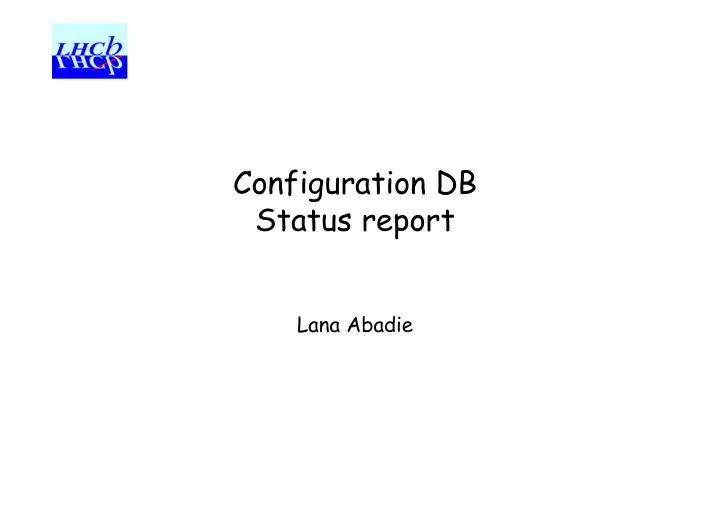

Configuration DB Status report Lana Abadie
Contents • Objectives & requirements (reminder) • TFC project status • DAQ project (in progress) • Routing tables : use case • Modeling the network with tables (1/2) • Routing table algorithm • Some results • Design and implementation rules • Conclusion 08/03/2005 LHCb week March 2005 2
Objectives & requirements (reminder) • Store all controllable devices with – their properties – the links between them – their hierarchy • Load necessary information for the ECS – to configure detectors – to start up an experiment – to monitor devices • Database design key aspects – generic schema – completeness – performance – maintenance 08/03/2005 LHCb week March 2005 3
TFC project status • TFC table design exists • Prototype in production • Use of JCOP tool to save devices and recipes in the conf DB from PVSS • Usable even if there is no DB connection via “a cache”. 08/03/2005 LHCb week March 2005 4
DAQ project (in progress) • DAQ table design exists (very similar to TFC design) • Main use case : generate routing/destination tables automatically given the network topology. (details in the next slides) Remaining things : • Implement a PVSS interface to configure switches • Design codes & job options for software installed in the farm nodes. 08/03/2005 LHCb week March 2005 5
Routing tables : use case Requirements: • Generated from the data contained in the DB • independent from the network topology • provide IP/Ethernet routing table Definitions: • Host node: a node which processes data • Intermediate node : a node which transfers data • Path : sequence of links whose sum of the link weights>0 Prerequisites: • Connectivity table (links between devices) • IP/Ethernet table (list of IP/Ethernet @ and devices) 08/03/2005 LHCb week March 2005 6
Modeling the network with tables (1/2) Host node 1 9 2 3 4 1 3 Intermediate. Intermediate. node 1 node 1 Oriented link 6 7 5 8 or not Intermediate. node 1 9 10 Host node 2 Host node 3 Link weight 08/03/2005 LHCb week March 2005 7
Modeling the network with tables (2/2) • Use of “trunk” links Host node 1 9 between devices -3 -1 3 Intermediate. Intermediate. node 1 node 1 -5 7 5 -7 Intermediate. node 1 9 10 Host node 2 Host node 3 08/03/2005 LHCb week March 2005 8
Routing table algorithm Principles – Find all the paths between the given switch and the reachable host nodes (destination) – For each reachable host, select the shortest path – Generate the routing table with the following entries: • IP and Ethernet @ of the next hop • Subnet mask, IP and Ethernet @ of the destination Implementation – Use of PL/SQL (portable, oracle language…) Extension – Destination table if no IP/Ethernet @ (cf TFC system) 08/03/2005 LHCb week March 2005 9
Some results FEs 343 FE and 102 SFCs SFCs MSs One routing table : 40 sec 6 routing tables : 3mn 39 Flow_0 SFCs FEs MSs Flow_1 F l MSs FEs o w SFCs _ 5 Flow_2 F l o w FEs MSs _ 4 SFCs SFCs Flow_3 MSs Gb Ethernet FEs Level-1 Traffic MSs SFCs HLT Traffic 08/03/2005 LHCb week March 2005 10 Mixed Traffic FEs MS:multiplexer switch
Design and implementation rules • For any subsystems, the design will include: – Device Type table – Device table – Connectivity table – Destination/routing tables (automatically generated) – JCOP tables (device structures, recipes, hierarchy) • Use of JCOP tool to save devices and recipes from PVSS to conf. DB • Implement a “cache” to run a PVSS project even if there is no DB connection (for institutes). 08/03/2005 LHCb week March 2005 11
Conclusion • TFC project in production: waiting for feedback. • DAQ project in good progress: may be in production for June • Tools to store connectivity, to check consistency… • Need to schedule a DB workshop with the subsystems by June. Please start to think of your requirements 08/03/2005 LHCb week March 2005 12
Recommend
More recommend